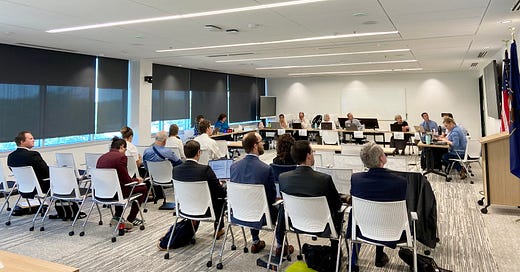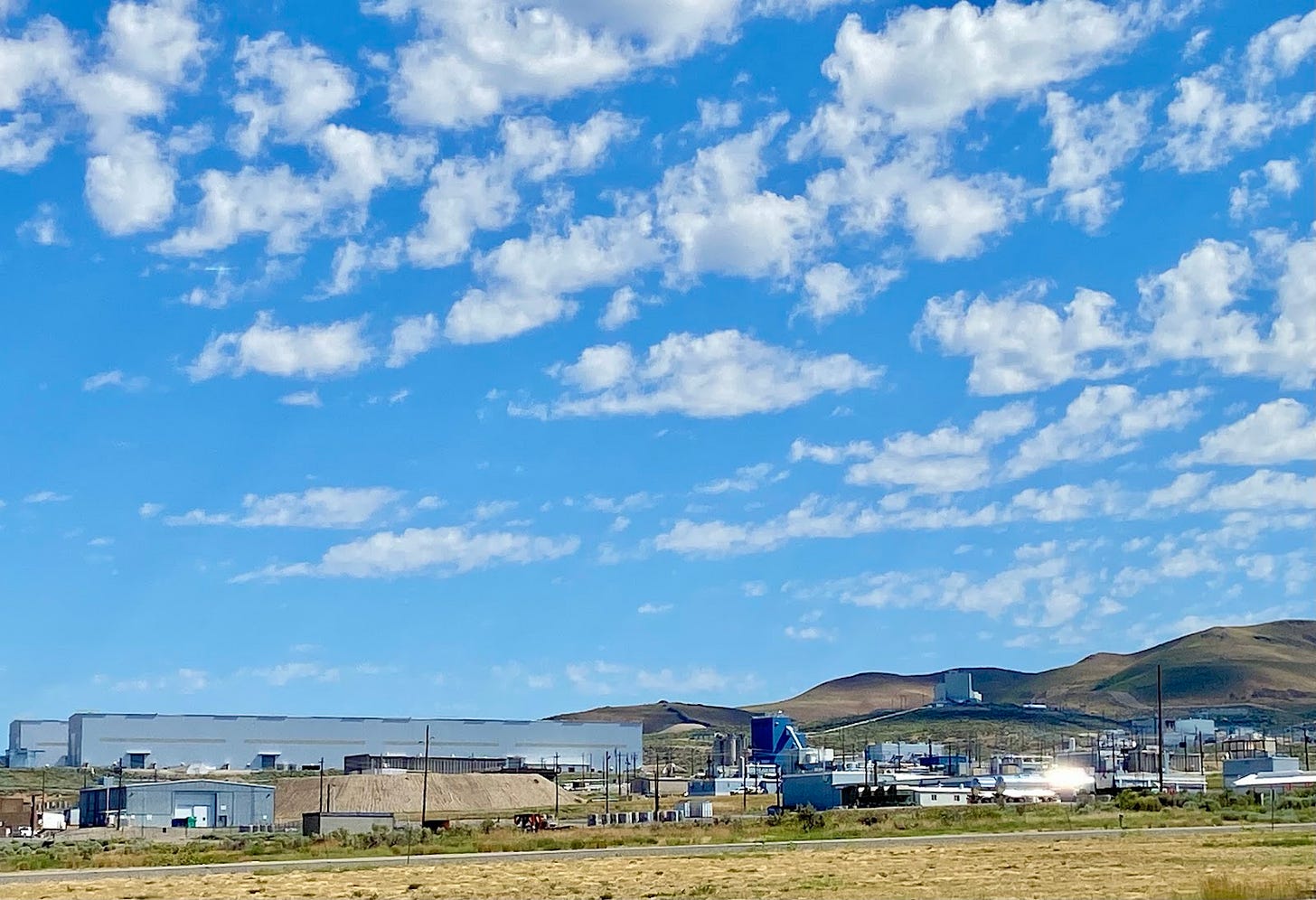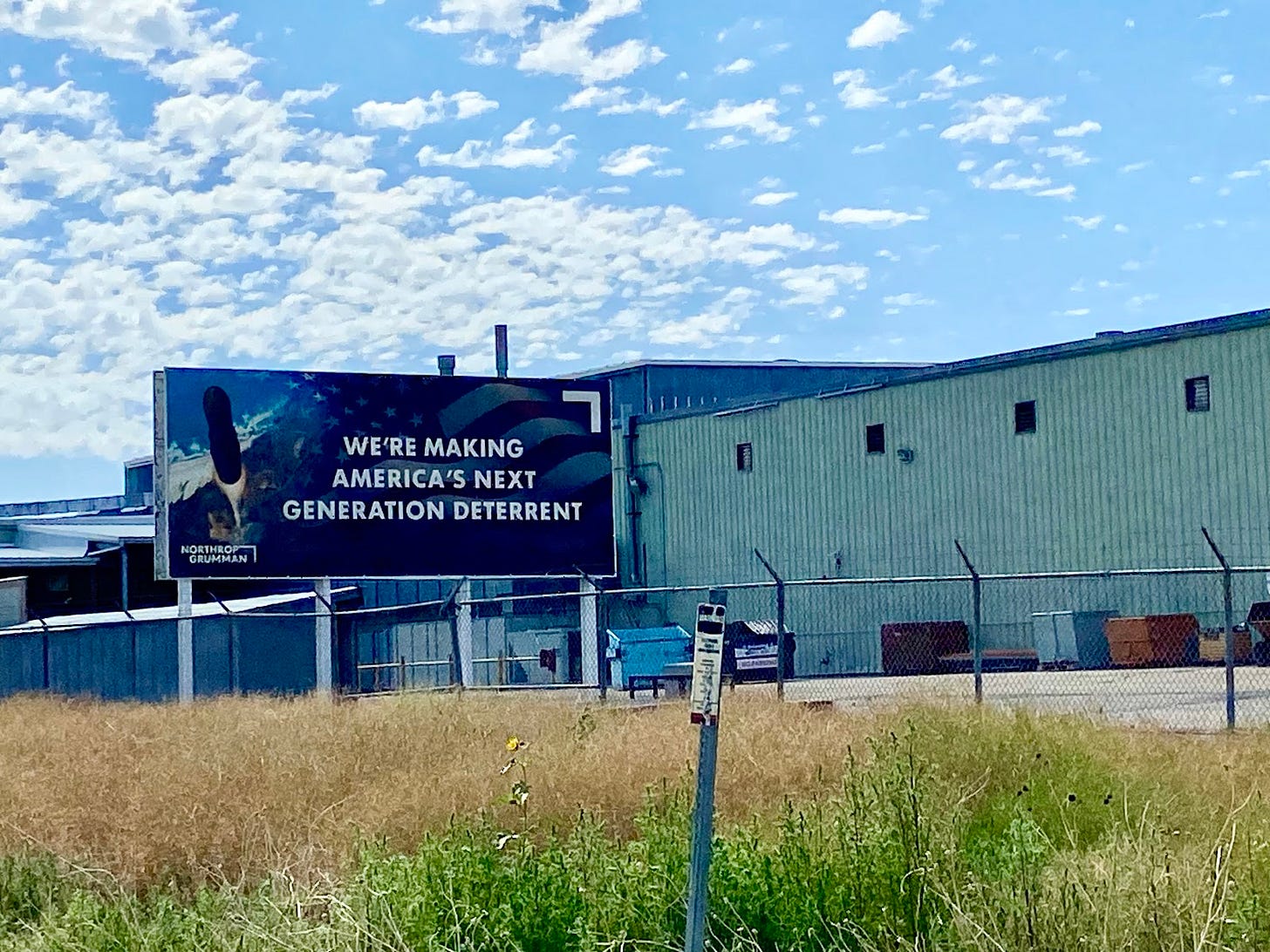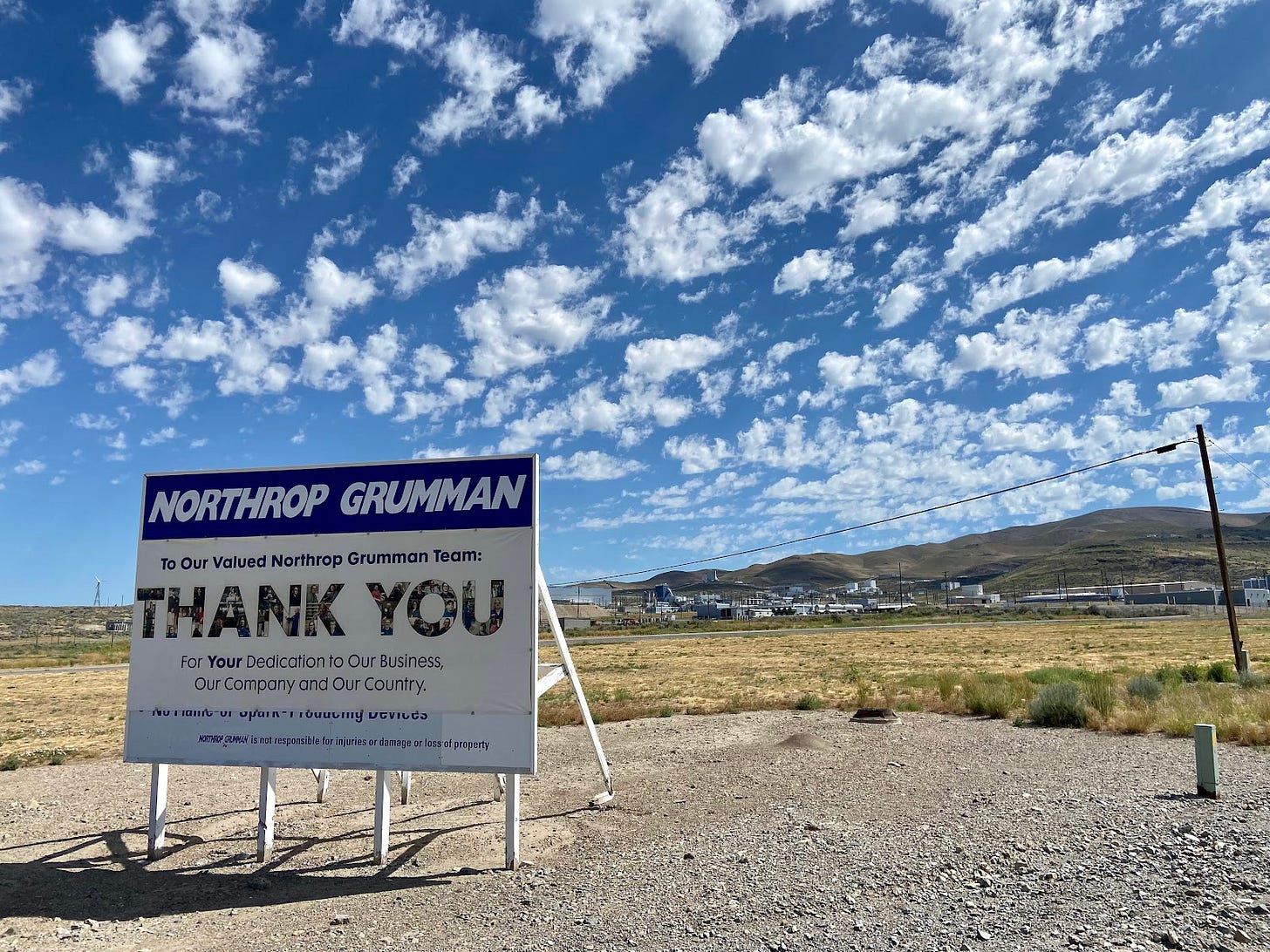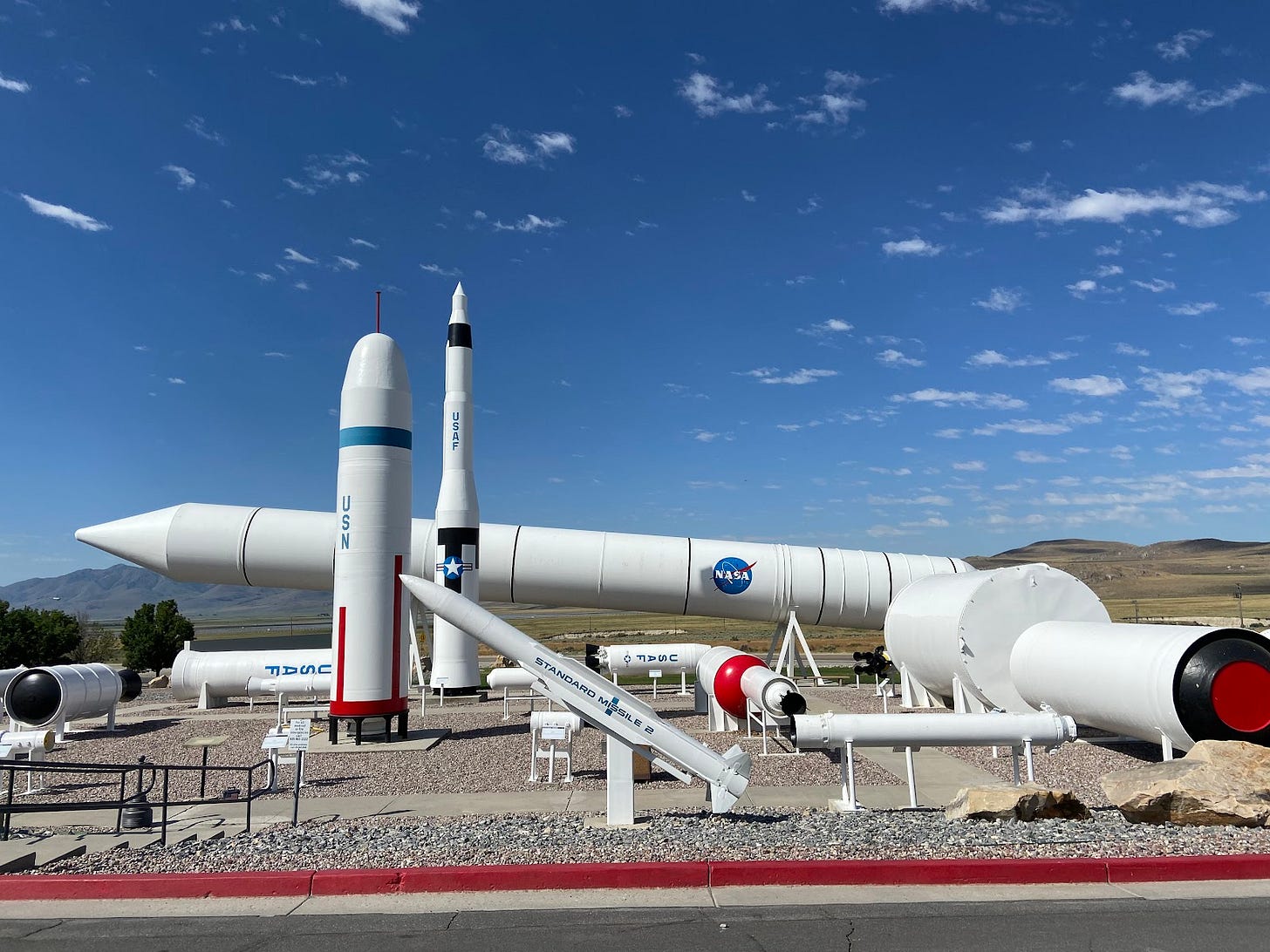A Not-So-Public Public Records Hearing in Utah
A committee voted in favor of Utah and Northrop Grumman against Inkstick’s appeal for an unredacted contract. Plus: a rocket garden.
Hi!
Greetings from Atlanta and welcome to the second dispatch of Military-Industrial America, a new newsletter from me, Taylor Barnes, Inkstick Media’s field reporter for the military-industrial complex. We had a glitch in sending out our first Military-Industrial America newsletter last week, and most of you didn't get it. You can read that first post here.
This week: Inkstick’s public records hearing in Utah, a photo diary of our trip to the state producing the new intercontinental ballistic missile, and some updates on labor at defense contractors.
“We couldn’t figure out why some of the redactions were redacted”
Inkstick Media lost its public records appeal at the Utah State Records Committee last week, which means our attorneys will be taking the case to court. Inkstick is seeking a full, unredacted version of Utah’s contract to subsidize Northrop Grumman’s intercontinental ballistic missile business in the state. The defense contractor and the government insist on redacting a key page that spells out the heart of the deal, which is, the number of jobs and salaries Northrop Grumman must provide in order to receive the tax cuts.
Elsewhere, Northrop Grumman has done extensive marketing about the number of jobs it claims the intercontinental ballistic missile or ICBM contract will create in congressional districts across the country. Below is a map the missile-maker puts out, with an unsubtle message to representatives on Capitol Hill that a vote against the ICBM is a vote against jobs for their constituents:
The Utah State Records Committee is an administrative body that meets monthly to hear a batch of public records disputes; before Inkstick’s case, we heard deliberations related to an inmate seeking prison records and an investigative journalist who wanted police reports. In those cases, the panel deliberated in front of the petitioners and the rest of the public, giving us insight into their decision-making.
But when it was Inkstick’s turn, something else happened. The committee members retreated behind closed doors, viewed an unredacted version of the contract, and when they emerged, seemed to have made their minds up. The committee voted unanimously against Inkstick, saying, in a nutshell, that the government could keep the contract out of public view since it had signed a nondisclosure agreement or NDA with the company.
However, one member expressed some uneasiness: “This has been very hard for the committee to decide what to do on this because we can see both sides of the case,” said Marie Cornwall, a citizen representative on the committee. “I think it should be on the record that we couldn’t figure out why some of the redactions were redacted.”
You can watch the hearing here. Read our full story here, and we’ll keep you updated about our court date.
Inkstick on KRCL!
I had the pleasure of being invited to a popular local news show in Salt Lake City to discuss our public records battle. I spoke with host Nick Burns, producer Lara Jones, and Scoville Peace Fellow and KRCL History Project Co-Director Barb Guy, who shared her personal stories about the civil society movement to resist the MX missile in Utah and protests at the Nevada nuclear weapons test site.
You can listen to our first interview here; I was back on last night to update listeners.
A Rocket Garden and ICBM Plant in the West Desert
I took advantage of my time in Utah to do some field visits. (There’s actually something pretty handy that’s not redacted in that contract I got from the government – on page 20, you’ll find a list of addresses of the facilities working on building the ICBM.)
Out in Utah’s West Desert, past two shooting ranges and some occasional sunflower fields, I came across a mile-long manufacturing complex for the ICBM in Corinne, Utah. Of course, a passer-by can’t really visit it because there’s a barbed-wire fence and a “Controlled Area” warning sign. Here’s what I could see:
That said, there actually is a place for visitors, a rocket garden (that’s what it’s called on Google maps!) at the southern tip of the plant. On display are a Minuteman I, a Trident, and a motor for the Peacekeeper (yes, this was once the name of a nuclear weapon).
From there, I returned to Salt Lake and made a pit stop at the Hill Air Force Base museum, which is adjacent to a gleaming corporate office for Northrop Grumman.
What I’m Reading
Breaking Down the Aerojet Union Loss in Huntsville
Our friends at the talk radio show “The Valley Labor Report” cover labor affairs in and around Huntsville, Alabama, the missile and rocket hub known cheekily as the “Pentagon of the South.” They reported that organizers at defense contractor Aerojet Rocketdyne recently lost a vote to join the Machinists union after an anti-union campaign that host Jacob Morrison said included telling workers they may go years without any raises if they organize and management passing out “vote no” anti-union bracelets. “If a CEO gets $11.5 million and you look at the price tag of these [rockets and missiles] when they go out, then you know [workers] deserve better,” organizer Phillip “Frenchie” French told Morrison.
Machinists Union Continues Call for ‘Buy American’ Defense Increase
The Machinists, the largest union in the defense industry, are calling for senators to support an amendment to the annual defense bill to increase domestic production requirements in weapons purchases from 55% to 75%. One American defense worker interviewed in a US-UK academic study we covered at Inkstick spoke plainly about how much Pentagon spending goes overseas rather than to American workers: “Most of the stuff [we make] is brought by the government, right so some of it’s – a lot of it is under the Buy American Act … which makes it that 50 or 55% of the parts that federal government buys has to be made in the United States. Due to free trade agreements, there’s about 45 countries that count as United States, that count as that 55%. So, when I tell somebody that I just lost [ANONYMISED] engine parts to [ANONYMISED country], they almost don’t believe me. They’re like ‘well, doesn’t that have to be made in the United States?’ No, it absolutely doesn’t.”
Thank You for Reading!
If you’re not a defense contractor or a government entity, we’d love for you to consider funding our work. Endless war is a defining feature of American life, and we believe there should be a public interest media outlet dedicated to covering it. You can read more about our work in our impact report.
Thoughts, comments, story suggestions? Send them our way. We may publish them in a future newsletter.
Taylor
Photos by Taylor Barnes and Lara Jones.


